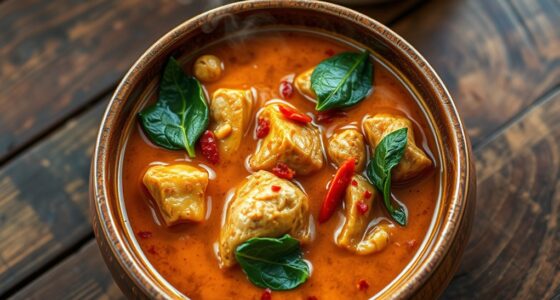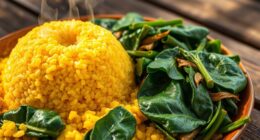In Ghanaian palm wine fermentation, you witness a lively dance of indigenous microbes from the environment, palm tree surfaces, and harvesters’ hands. These bacteria, yeasts, and fungi create a rich, complex ecosystem that transforms fresh sap into a fizzy, flavorful beverage. Each batch varies due to natural microbial diversity, making every sip unique. As you explore deeper, you’ll discover how these microorganisms shape the taste, aroma, and tradition behind this cherished drink.
Key Takeaways
- Ghanaian palm wine fermentation relies on natural, indigenous microorganisms from environment, sap, and containers, creating a diverse microbial ecosystem.
- Microorganisms such as bacteria, wild yeasts, and fungi work synergistically to produce alcohol, carbonation, and aromatic compounds.
- Fermentation duration and quality are influenced by environmental factors and microbial diversity, leading to unique, variable flavors.
- The traditional process emphasizes organic, non-controlled fermentation, preserving microbial biodiversity and cultural authenticity.
- Understanding microbial communities helps ensure product safety, enhance flavor complexity, and support artisanal Ghanaian palm wine practices.

Have you ever wondered what makes Ghanaian palm wine uniquely fermented? The answer lies in the traditional fermentation process that has been passed down through generations. Unlike commercial methods, traditional fermentation relies on natural, indigenous microorganisms present in the environment, the palm sap, and the equipment used. This process creates a rich and complex microbial diversity that is central to the wine’s distinctive flavor and aroma. When you partake in the fermentation of Ghanaian palm wine, you’re experiencing a biological symphony driven by countless microbes working together in harmony. These microorganisms include various bacteria, wild yeasts, and fungi, each playing a crucial role in transforming the sap into a drink with a lively effervescence and a mildly sweet, tangy taste. The diversity among these microbes influences not only the flavor profile but also the fermentation speed and the wine’s overall quality.
In traditional Ghanaian practices, the palm sap is often collected early in the morning and immediately transferred into fermentation containers made from bamboo, gourds, or clay. These natural containers, combined with the environment, permit a diverse range of microorganisms to colonize the sap quickly. Unlike industrial fermentation, which often involves sterilized equipment and controlled conditions, traditional fermentation embraces this microbial diversity. It’s this organic approach that adds complexity and depth to the wine, making each batch unique. The microbes from the surrounding air, the palm tree surface, and even the handler’s hands contribute to the microbial community, creating a dynamic ecosystem that shapes the fermentation process. This diversity also means that each batch can vary slightly in taste, aroma, and effervescence, offering a truly artisanal experience. Additionally, understanding microbial communities involved in traditional fermentation can help preserve these practices and ensure the health and safety of the final product.
Furthermore, the interplay between different microbes helps regulate the fermentation, often preventing unwanted spoilage organisms from taking over. This natural microbial balance ensures that the palm wine develops its characteristic flavor without the need for added chemicals or preservatives. Understanding microbial communities involved can help preserve these traditional practices and improve the consistency of the final product. The process can take anywhere from a few hours to a couple of days, depending on the climate and the desired taste. As fermentation progresses, the microbes produce alcohol, carbon dioxide, and a variety of aromatic compounds that give Ghanaian palm wine its signature freshness and complexity. The reliance on traditional fermentation methods highlights the importance of microbial diversity in creating a product that is both culturally significant and uniquely Ghanaian. It’s this vibrant microbial ecosystem that makes Ghanaian palm wine not just a beverage but a living reflection of local tradition and natural biodiversity.
Frequently Asked Questions
What Are the Health Benefits of Fermented Ghanaian Palm Wine?
You might wonder about the health benefits of fermented Ghanaian palm wine. It offers nutritional benefits like vitamins and minerals that support your overall health. Plus, its probiotic properties help improve your gut health by promoting good bacteria. Drinking it in moderation can boost your immune system, aid digestion, and enhance nutrient absorption. So, incorporating this traditional beverage could be a flavorful way to enjoy some added health advantages.
How Does Climate Affect Palm Wine Fermentation in Ghana?
Climate variability profoundly impacts palm wine fermentation in Ghana. Warmer temperatures speed up fermentation, leading to quicker spoilage, while cooler climates slow down the process, affecting flavor and aroma. You’ll notice that fermentation temperature fluctuates with seasonal changes, influencing the wine’s quality. Maintaining consistent conditions is essential for ideal fermentation, so you might need to adjust practices based on climate patterns to guarantee the best taste and safety of the palm wine.
Are There Traditional Rituals Associated With Palm Wine Fermentation?
Ever wondered if palm wine fermentation has its own rituals? You’ll find that traditional rituals hold deep cultural symbolism, emphasizing respect for the process and the spirits involved. These rituals, often performed by elders, highlight the ritual significance of fermentation, marking celebrations or spiritual ceremonies. They serve as a bridge between communities and their heritage, ensuring the cultural symbolism of palm wine remains alive and respected in Ghanaian society.
What Are Common Contaminants in Improperly Fermented Palm Wine?
You should be aware that improperly fermented palm wine can harbor microbial contamination, which may cause illness or spoilage. Chemical impurities, like unwanted alcohols or contaminants from equipment, can also taint the wine’s flavor and safety. These issues arise when fermentation isn’t carefully controlled or sanitation is neglected. To enjoy authentic, safe palm wine, guarantee proper fermentation practices and maintain clean equipment throughout the process.
How Is Fermentation Controlled to Ensure Safety and Quality?
To guarantee safety and quality, you should focus on fermentation monitoring throughout the process. Regularly check temperature, pH, and sugar levels to keep fermentation on track. Implement quality assurance measures like using clean equipment and controlling environmental conditions. By actively overseeing fermentation, you prevent contamination and ensure your palm wine develops desirable flavors and safety standards, making it more appealing and safe for consumers.
Conclusion
As you explore the world of Ghanaian palm wine fermentation, you’ll discover a craft as ancient and intricate as the stars themselves. Every sip carries centuries of tradition, a living testament to Ghana’s rich cultural tapestry. By understanding this process, you reveal a universe of flavors and stories that could easily outshine the brightest constellations. So, embrace the journey — it’s a taste adventure that’s truly cosmic in its depth and wonder.










